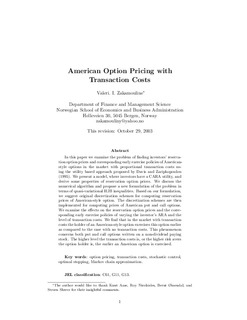American option pricing with transaction costs
Working paper

View/
Date
2003-10Metadata
Show full item recordCollections
- Discussion papers (FOR) [566]
Abstract
In this paper we examine the problem of finding investors’ reservation option prices and corresponding early exercise policies of American-style options in the market with proportional transaction costs using the utility based approach proposed by Davis and Zariphopoulou (1995). We present a model, where investors have a CARA utility, and derive some properties of reservation option prices. We discuss the numerical algorithm and propose a new formulation of the problem in terms of quasi-variational HJB inequalities. Based on our formulation, we suggest original discretization schemes for computing reservation prices of American-style option. The discretization schemes are then implemented for computing prices of American put and call options. We examine the effects on the reservation option prices and the corresponding early exercise policies of varying the investor’s ARA and the level of transaction costs. We find that in the market with transaction costs the holder of an American-style option exercises this option earlier as compared to the case with no transaction costs. This phenomenon concerns both put and call options written on a non-dividend paying stock. The higher level the transaction costs is, or the higher risk avers the option holder is, the earlier an American option is exercised.
Publisher
Norwegian School of Economics and Business Administration. Department of Finance and Management ScienceSeries
Discussion paper2003:15